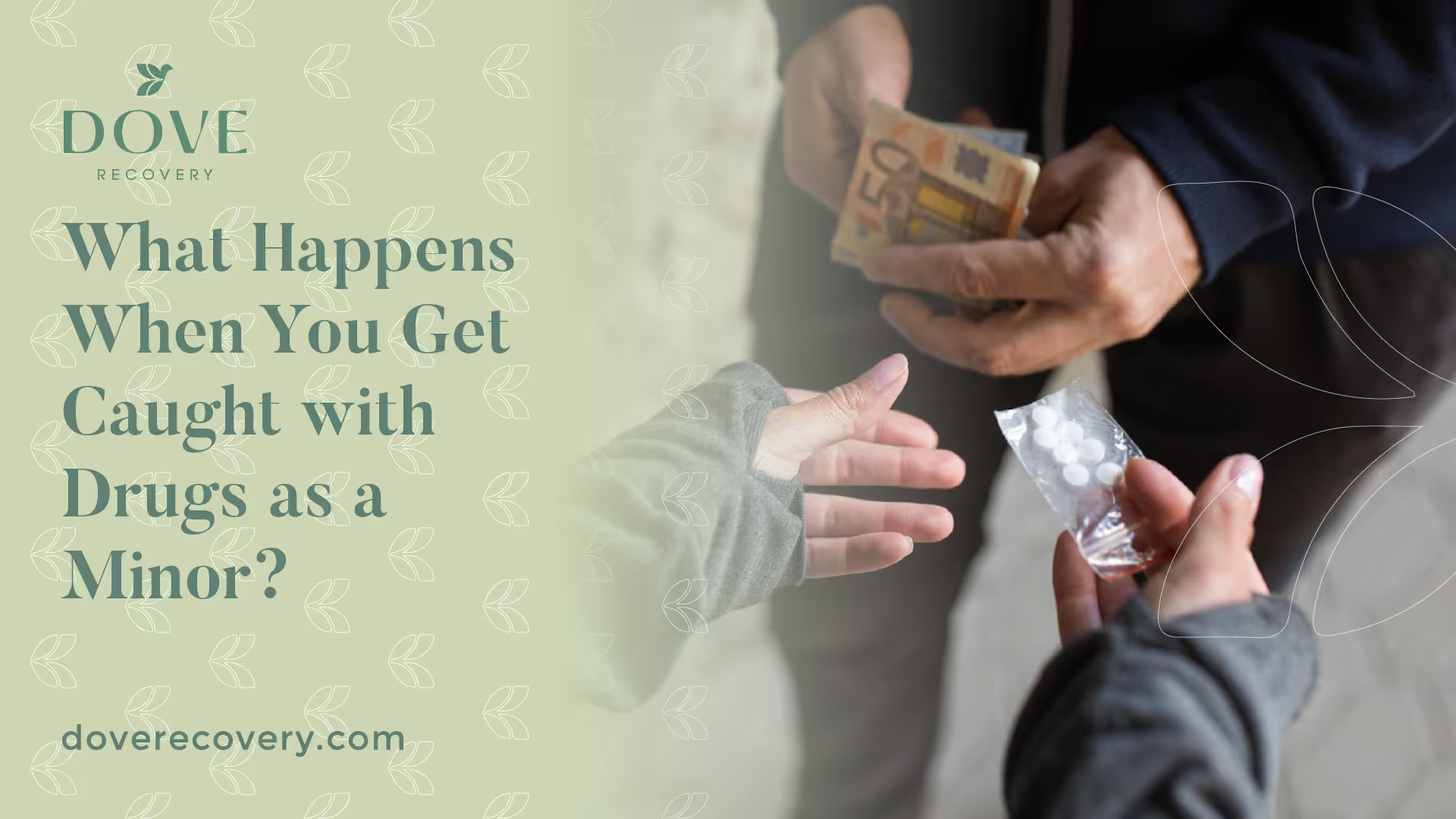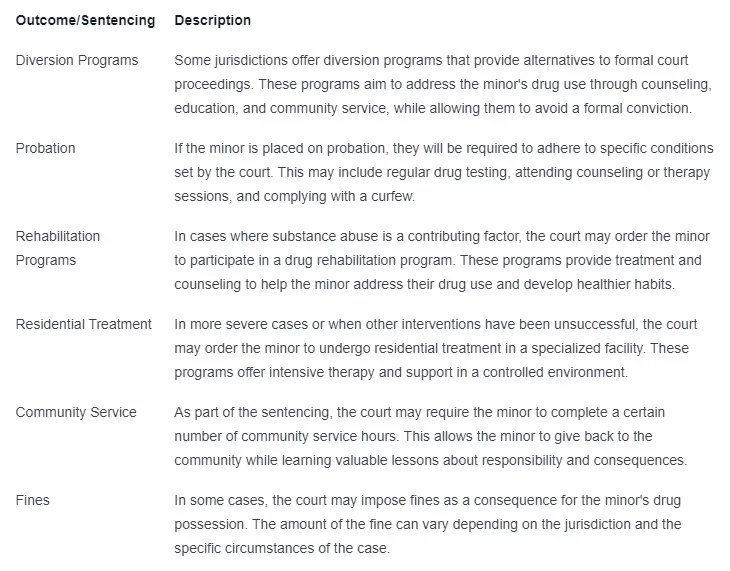What Happens When You Get Caught with Drugs as a Minor?

Understanding Juvenile Drug Possession Charges
When it comes to juvenile drug possession charges, it is important to have a clear understanding of what constitutes such charges and the legal consequences that may follow.

What Constitutes Juvenile Drug Possession
Juvenile drug possession refers to the act of a minor being found in possession of illicit substances, such as illegal drugs or controlled substances. The specific laws regarding juvenile drug possession may vary depending on the jurisdiction, but generally, it involves the intentional possession or control of prohibited substances.
It is important to note that possession can be actual, where the drugs are physically on the person, or constructive, where the drugs are within the minor's control. Additionally, the possession can be either sole or joint, meaning the minor may be charged even if they are not the sole possessor of the drugs.
Legal Consequences for Juvenile Drug Possession
The legal consequences for juvenile drug possession charges can be significant and vary depending on several factors, including the type and quantity of drugs involved, prior offenses, and jurisdiction-specific laws. The consequences can range from diversion programs and rehabilitation to more severe penalties, such as probation, fines, community service, or even incarceration.
To understand the potential legal consequences in your jurisdiction, it is important to consult the specific drug possession laws for minors in your area.
Navigating the legal process can be overwhelming, especially for juveniles and their families. It is crucial to seek legal guidance and support from professionals who specialize in juvenile law. They can provide valuable assistance in understanding the charges, explaining the available options, and developing an effective defense strategy.
Understanding the gravity of juvenile drug possession charges and the potential legal consequences is the first step toward finding the best path forward. By seeking appropriate legal guidance and support, you can navigate the legal process with more confidence and work toward a positive resolution.
Building Resilience
After facing juvenile drug possession charges, it is important for individuals to focus on building resilience and finding ways to navigate through this challenging time. By acknowledging the situation and seeking legal guidance and support, juveniles can begin their journey towards a more positive future.
Acknowledging the Situation
The first step in building resilience is acknowledging the reality of the situation. It is crucial for juveniles to understand the seriousness of the charges they are facing and the potential consequences that come with them. By accepting responsibility for their actions, they can begin to explore ways to move forward.
Acknowledgment also involves recognizing the impact that drug possession charges can have on various aspects of life, including relationships, education, and future opportunities. It's important to be aware of the potential long-term consequences and the steps that need to be taken in order to address them.
Seeking Legal Guidance and Support
When facing juvenile drug possession charges, seeking legal guidance and support is essential. Consulting with an experienced attorney who specializes in juvenile law can provide invaluable assistance throughout the legal process. These professionals can help juveniles understand their rights, navigate the juvenile court system, and explore defense strategies.
In addition to legal guidance, it is important to seek support from trusted individuals such as family members, friends, or mentors. Their emotional support and guidance can provide a much-needed source of strength during this challenging time. Juveniles may also benefit from joining support groups or seeking counseling services that specialize in substance abuse and legal issues.
By acknowledging the situation and seeking legal guidance and support, individuals facing juvenile drug possession charges can begin to build the resilience necessary to overcome this difficult experience. It is important to remember that with the right mindset and support system, it is possible to move forward and build a positive future.
Navigating the Legal Process
When confronted with juvenile drug possession charges, it's important for both the minor and their guardians to understand the legal process they will go through. This section provides an overview of the juvenile court system and explores the potential outcomes and sentencing that can result from a drug possession charge.
Juvenile Court System Overview
The juvenile court system is designed to handle cases involving minors who have been accused of committing crimes. Unlike the adult criminal justice system, the focus of the juvenile court system is on rehabilitation and providing opportunities for the minor to learn from their mistakes and make positive changes.
In the United States, the specifics of the juvenile court system can vary from state to state. However, it generally operates on the principle of parens patriae, which means that the court acts in the best interest of the child. The court aims to address the underlying issues that may have contributed to the minor's involvement in drug possession and provide them with the necessary support and resources for rehabilitation.
Throughout the legal process, it is essential to have legal representation to ensure that the minor's rights are protected and to navigate the complex legal procedures. Seeking guidance from an experienced attorney who specializes in juvenile law is crucial. They can provide expert advice on the specific laws and regulations in your jurisdiction.
Potential Outcomes and Sentencing
The potential outcomes and sentencing for juvenile drug possession charges can vary depending on the circumstances of the case, the jurisdiction, and the minor's prior record. The focus of the juvenile justice system is often on rehabilitation rather than punishment, with an emphasis on addressing the root causes of the minor's involvement with drugs.
Possible outcomes and sentencing options can include:

Understanding the potential outcomes and sentencing options is crucial for both the minor and their guardians. It's important to consult with an attorney who can provide guidance on the specific laws and regulations in your jurisdiction.
By being informed about the juvenile court system and the potential outcomes and sentencing for drug possession charges, you can better navigate the legal process and work towards a positive resolution for the minor involved.
Moving Forward
After facing juvenile drug possession charges, it's important to focus on moving forward and rebuilding one's life. This section will explore some options and resources that can aid in the process of moving forward after such a challenging experience.
Rehabilitation and Treatment Options
Rehabilitation and treatment are crucial components of moving forward after juvenile drug possession charges. It's essential to address any underlying issues related to substance abuse and work towards recovery. There are various rehabilitation and treatment options available, including:
Inpatient Rehabilitation - Provides a structured environment where individuals can receive round-the-clock care and support. This can be particularly helpful for those with severe substance abuse issues.
Outpatient Rehabilitation - Offers flexibility by allowing individuals to live at home while attending treatment sessions during the day. This option can be suitable for those with milder substance abuse problems or supportive home environments.
Counseling and Therapy - Individual counseling or therapy sessions can be beneficial in addressing the underlying causes of substance abuse and developing coping mechanisms to prevent relapse. Group therapy can also provide support and a sense of community.
Support Groups - Participating in support groups, such as Narcotics Anonymous (NA) or other community-based programs, can provide a network of individuals who have faced similar challenges. These groups offer understanding, guidance, and encouragement throughout the recovery journey.
Aftercare Programs - After completing rehabilitation or treatment, aftercare programs can provide ongoing support and guidance to help maintain sobriety and prevent relapse. These programs may include regular check-ins, counseling, and access to resources and support networks.
It's important to consult with professionals in the field to determine the most appropriate rehabilitation and treatment options based on individual circumstances and needs.
Support Networks and Resources
Building a strong support network is crucial for moving forward after juvenile drug possession charges. The journey to recovery can be challenging, but having a supportive environment can provide the necessary encouragement and guidance. Some valuable support networks and resources include:
- Family and Friends: Lean on trusted family members and friends who can provide emotional support and understanding throughout the recovery process.
- Mentors and Role Models: Seek out positive role models or mentors who can offer guidance and serve as a source of inspiration on the path to recovery.
- Community and Faith-based Organizations: Engage with community organizations and religious or faith-based groups that offer support and resources for individuals overcoming substance abuse challenges.
- Educational and Vocational Support: Explore educational and vocational opportunities that can help rebuild one's life. This may include pursuing further education, vocational training, or seeking employment support services.
- Recovery-focused Websites and Forums: Online platforms dedicated to recovery can provide valuable information, resources, and a supportive community of individuals who have gone through similar experiences.
By utilizing these support networks and resources, individuals can find the guidance and encouragement needed to navigate the challenges of rebuilding their lives after juvenile drug possession charges. Remember that each person's journey is unique, and seeking professional help is essential for creating a personalized plan for moving forward.
Building a Positive Future
After facing juvenile drug possession charges, it is crucial to focus on building a positive future. This involves learning from mistakes and prioritizing personal growth and development. By taking proactive steps, individuals can overcome the challenges they have faced and move forward with resilience.
Learning from Mistakes
One of the most important aspects of building a positive future after juvenile drug possession charges is learning from past mistakes. It's essential to reflect on the choices made and the consequences that arose from those actions. By acknowledging the impact of those decisions, individuals can gain valuable insights and make better choices moving forward.
Learning from mistakes also involves understanding the potential risks and harms associated with drug use. Educating oneself about the dangers of substance abuse can be a powerful deterrent and motivate individuals to make healthier choices.
Focusing on Personal Growth and Development
Building a positive future after juvenile drug possession charges requires a focus on personal growth and development. This involves setting goals, cultivating healthy habits, and pursuing opportunities for self-improvement.
Rehabilitation and treatment options play a vital role in personal growth. Seeking professional help, such as therapy or counseling, can provide individuals with the necessary tools to address underlying issues and develop healthier coping mechanisms.
It is also important to establish a support network consisting of family, friends, mentors, or support groups. These individuals can provide guidance, encouragement, and accountability throughout the recovery and personal growth process.
Focusing on personal growth and development may involve exploring new interests, hobbies, or educational opportunities. By channeling energy into positive pursuits, individuals can redirect their lives toward a brighter future. It's important to remember that growth is a continuous journey, and setbacks may occur. However, with resilience, determination, and the right support, building a positive future after juvenile drug possession charges is indeed possible.
Conclusion
Building a positive future after facing juvenile drug possession charges requires a combination of effort, support, and resilience. By acknowledging the situation, seeking legal guidance and support, navigating the legal process, and focusing on personal growth and development, individuals can move forward with confidence and create a brighter future. Remember that each person's journey is unique, and with the right mindset and support system, it is possible to overcome challenges and build a positive future.
